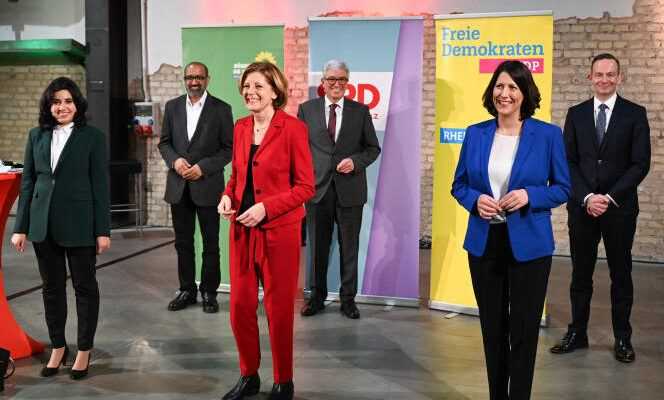In Mainz, it is well known, it all starts with a good wine. In the capital of the wine-growing Land of Rhineland-Palatinate, former stronghold of Helmut Kohl, twinned for forty years with Burgundy, politicians never fail to point out that a day of difficult discussions often ends with a dinner washed down with wine. one of the region’s grape varieties. “Personally, it’s my favorite Riesling, specifies Daniela Schmitt, regional minister of the economy, member of the liberal FDP party. It is the wine that is most often unanimous. “
The culture of conviviality, even between adversaries, is a marker of the political culture of this rather rural Land of 4 million inhabitants. An element considered one of the keys to the success of the coalition – unique in Germany -, which has led the regional government in Mainz since 2016, and which was renewed in the spring. This political combination, nicknamed “traffic light coalition” or “traffic light”, in reference to the colors of the parties that make it up – red for the SPD, yellow for the FDP, green for environmentalists – is currently the subject of all the discussions. attention in Berlin: Wednesday, October 6, these three parties announced their intention to negotiate with a view to forming, for the first time in German history, a “traffic light” government at federal level, under the leadership of a possible chancellor Social Democrat, Olaf Scholz (SPD).
How can a coalition of this type function, despite the deep differences between the parties? And above all, is such an alliance less stable than the traditional two-way coalition? These are the questions that worry observers and political leaders since the “traffic light” option seems to be imposed in the discussions resulting from the September 26 elections. No wonder, then, that two political figures from Rhineland-Palatinate were chosen to lead the negotiations for their respective parties: Malu Dreyer, the popular SPD Minister-President of the Rhineland-Palatinate region, and Volker Wissing, former regional minister of the economy, current secretary general of the FDP. The two politicians talk to each other and maintain a relationship of trust thanks to five years of government work in Mainz.
Equilateral triangle tables
“Between Dreyer and Wissing, the current immediately passed”, remembers Bernhard Braun, chairman of the environmental parliamentary group in Mainz, who has worked closely with them since 2016. Mr. Braun displays the typical look of early German environmentalists: with his suit, he wears white sneakers, which are ‘match perfectly with her hair cut into a long bob. At 63, he has a long experience of regional policy. “Five years ago, the SPD-Greens alliance was no longer sufficient to form a majority. It was necessary to ally with the FDP. At the beginning, we asked ourselves the same question that is agitating Berlin at the moment: how to form a coalition of three? “
You have 58.59% of this article to read. The rest is for subscribers only.
